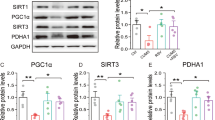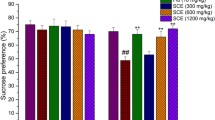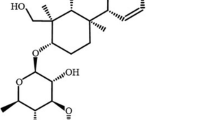Abstract
Background
Chronic unpredictable mild stress (CUMS) is an important contributing factor for depression with inflammatory response alteration, neuron apoptosis, and decreased neurogenesis. Previous study reported that the administration of resveratrol alleviated depression by normalizing the increased proinflammatory cytokine levels and inhibiting apoptosis in the hippocampus. However, the upstream signaling pathway that regulates cytokines and apoptosis in the antidepressant effect of resveratrol remains unclear.
Objective
The objective of this study is to investigate the possible mechanism of the effect of resveratrol on depression.
Methods
Male Sprague Dawley rats were exposed to CUMS for four consecutive weeks to elicit depressive-like behavior. The rats in the drug treatment groups were injected with resveratrol (40 or 80 mg/kg/day) and fluoxetine (10 mg/kg/day) intraperitoneally for 4 weeks. Rats in two additional groups were administered LY294002 by bilateral stereotaxic microinjection into the lateral ventricle before resveratrol administration. Behavioral tests, including sucrose preference test, forced swim test, and open field test, were used after 4 weeks of a CUMS procedure to appraise depressive-like behavior. Then, the proinflammatory cytokines (TNF-α, IL-6, and IL-1β) in the hippocampus and prefrontal cortex (PFC) tissues of rats were measured. Apoptosis-related molecules such as Bax and Bcl-2 mRNA levels in the hippocampus were analyzed. Furthermore, p-Akt/Akt and p-GSK3β/GSK3β protein expression in the hippocampus were also measured.
Results
The results show that rats were subjected to CUMS procedure exhibited depressive-like behavior, increased TNF-α, IL-6, and IL-1β levels in hippocampus and PFC, alteration of Bax and Bcl-2 mRNA levels in hippocampus, decreased p-Akt/Akt and p-GSK3β/GSK3β protein expression in hippocampus, and an increased apoptotic cell percentage in the hippocampal CA1 region. However, resveratrol (40 or 80 mg/kg) treatment reversed these behavioral and molecular changes in CUMS rats. The positive control drug fluoxetine showed a similar effect as the resveratrol treatment. When rats were injected with LY294002 before resveratrol treatment, the antidepressant effect of resveratrol was significantly attenuated, TNF-α, IL-6 and IL-1β levels in hippocampus and PFC increased again, Bax mRNA levels increased and Bcl-2 mRNA levels decreased in hippocampus, and Akt/GSK3β protein expression in hippocampus decreased.
Conclusions
The findings in the present study suggest that the antidepressant effect of resveratrol treatment may act through activation of the Akt/GSK3β signaling pathway and then regulation of proinflammatory cytokine expression and alteration of apoptosis.







Similar content being viewed by others
References
Akpinar A, Uğuz AC, Nazıroğlu M (2014) Agomelatine and duloxetine synergistically modulates apoptotic pathway by inhibiting oxidative stress triggered intracellular calcium entry in neuronal PC12 cells: role of TRPM2 and voltage-gated calcium channels. J Membr Biol 247: 451–9
Ali SH, Madhana RM, K V A, Kasala ER, Bodduluru LN, Pitta S, Mahareddy JR, Lahkar M (2015) Resveratrol ameliorates depressive-like behavior in repeated corticosterone-induced depression in mice. Steroids 101: 37–42
Banasr M, Dwyer JM, Duman RS (2011) Cell atrophy and loss in depression: reversal by antidepressant treatment. Curr Opin Cell Biol 23:730–737
Beaulieu JM, Gainetdinov RR, Caron MG (2009) Akt/GSK3 signaling in the action of psychotropic drugs. Annu Rev Pharmacol Toxicol 49:327–347
Berton O, Nestler EJ (2006) New approaches to antidepressant drug discovery: beyond monoamines. Nat Rev Neurosci 7:137–151
Cole AR (2013) Glycogen synthase kinase 3 substrates in mood disorders and schizophrenia. FEBS J 280:5213–5227
Ding L, Zhang C, Masood A, Li J, Sun J, Nadeem A, Zhang HT, O’Donnell JM, Xu Y (2014) Protective effects of phosphodiesterase 2 inhibitor on depression- and anxiety-like behaviors: involvement of antioxidant and anti-apoptotic mechanisms. Behav Brain Res 268:150–158
Dygalo NN, Kalinina TS, Bulygina VV, Shishkina GT (2012) Increased expression of the anti-apoptotic protein Bcl-xL in the brain is associated with resilience to stress-induced depression-like behavior. Cell Mol Neurobiol 32:767–776
Edwards SJ, Hamilton V, Nherera L, Trevor N (2013) Lithium or an atypical antipsychotic drug in the management of treatment-resistant depression: a systematic review and economic evaluation. Health Technol Assess 17:1–190
Ge L, Liu L, Liu H, Liu S, Xue H, Wang X, Yuan L, Wang Z, Liu D (2015) Resveratrol abrogates lipopolysaccharide-induced depressive-like behavior, neuroinflammatory response, and CREB/BDNF signaling in mice. Eur J Pharmacol 768:49–57
Huang HJ, Zhu XC, Han QQ, Wang YL, Yue N, Wang J, Yu R, Li B, Wu GC, Liu Q, Yu J (2017) Ghrelin alleviates anxiety- and depression-like behaviors induced by chronic unpredictable mild stress in rodents. Behav Brain Res 326:33–43
Kara A, Unal D, Simsek N, Yucel A, Yucel N, Selli J (2014) Ultra-structural changes and apoptotic activity in cerebellum of post-menopausal-diabetic rats: a histochemical and ultra-structural study. Gynecol Endocrinol 30: 226–31
Koolschijn PC, van Haren NE, Lensvelt-Mulders GJ, Hulshoff Pol HE, Kahn RS (2009) Brain volume abnormalities in major depressive disorder: a meta-analysis of magnetic resonance imaging studies. Hum Brain Mapp 30: 3719–35
Li H, Linjuan-Li, Wang Y (2016) G-CSF improves CUMS-induced depressive behaviors through downregulating Ras/ERK/MAPK signaling pathway. Biochem Biophys Res Commun 479:827–832
Liu XL, Luo L, Liu BB, Li J, Geng D, Liu Q, Yi LT (2014a) Ethanol extracts from Hemerocallis citrina attenuate the upregulation of proinflammatory cytokines and indoleamine 2,3-dioxygenase in rats. J Ethnopharmacol 153:484–490
Liu Z, Guo H, Cao X, Cheng C, Yang C, Xu C, Zhang A, Sun N, Li X, Zhang K (2014b) A combined study of GSK3beta polymorphisms and brain network topological metrics in major depressive disorder. Psychiatry Res 223:210–217
Ludka FK, Constantino LC, Dal-Cim T, Binder LB, Zomkowski A, Rodrigues AL, Tasca CI (2016) Involvement of PI3K/Akt/GSK-3beta and mTOR in the antidepressant-like effect of atorvastatin in mice. J Psychiatr Res 82:50–57
MacQueen GM, Campbell S, McEwen BS, Macdonald K, Amano S, Joffe RT, Nahmias C, Young LT (2003) Course of illness hippocampal function, and hippocampal volume in major depression. Peoc Natl Acad Sci USA 100: 1387–92
Makhija K, Karunakaran S (2013) The role of inflammatory cytokines on the aetiopathogenesis of depression. Aust N Z J Psychiatry 47:828–839
Miller AH, Maletic V, Raison CL (2009) Inflammation and its discontents: the role of cytokines in the pathophysiology of major depression. Biol Psychiatry 65:732–741
Morais M, Santos PA, Mateus-Pinheiro A, Patricio P, Pinto L, Sousa N, Pedroso P, Almeida S, Filipe A, Bessa JM (2014) The effects of chronic stress on hippocampal adult neurogenesis and dendritic plasticity are reversed by selective MAO-A inhibition. J Psychopharmacol 28:1178–1183
Orellana AM, Vasconcelos AR, Leite JA, de Sa LL, Andreotti DZ, Munhoz CD, Kawamoto EM, Scavone C (2015) Age-related neuroinflammation and changes in AKT-GSK-3beta and WNT/ beta-CATENIN signaling in rat hippocampus. Aging (Albany NY) 7:1094–1111
Pan B, Liu Y (2015) Effects of duloxetine on microRNA expression profile in frontal lobe and hippocampus in a mouse model of depression. Int J Clin Exp Pathol 8:15454–15461
Platenik J, Fisar Z, Buchal R, Jirak R, Kitzlerova E, Zverova M, Raboch J (2014) GSK3beta, CREB, and BDNF in peripheral blood of patients with Alzheimer’s disease and depression. Prog Neuro-Psychopharmacol Biol Psychiatry 50:83–93
Rethorst CD, Toups MS, Greer TL, Nakonezny PA, Carmody TJ, Grannemann BD, Huebinger RM, Barber RC, Trivedi MH (2013) Pro-inflammatory cytokines as predictors of antidepressant effects of exercise in major depressive disorder. Mol Psychiatry 18:1119–1124
Savitz J, Drevets WC, Smith CM, Victor TA, Wurfel BE, Bellgowan PS, Bodurka J, Teague TK, Dantzer R (2015) Putative neuroprotective and neurotoxic kynurenine pathway metabolites are associated with hippocampal and amygdalar volumes in subjects with major depressive disorder. Neuropsychopharmacology 40: 463–71
Shen J, Zhang J, Deng M, Liu Y, Hu Y, Zhang L (2016) The antidepressant effect of Angelica sinensis extracts on chronic unpredictable mild stress-induced depression is mediated via the upregulation of the BDNF signaling pathway in rats. Evid Based Complement Alternat Med 2016:7434692
Shyong YJ, Wang MH, Kuo LW, Su CF, Kuo WT, Chang KC, Lin FH (2017) Mesoporous hydroxyapatite as a carrier of olanzapine for long-acting antidepression treatment in rats with induced depression. J Control Release 255:62–72
Silva R, Mesquita AR, Bessa J, Sousa JC, Sotiropoulos I, Leao P, Almeida OF, Sousa N (2008) Lithium blocks stress-induced changes in depressive-like behavior and hippocampal cell fate: the role of glycogen-synthase-kinase-3beta. Neuroscience 152:656–669
Stratmann M, Konrad C, Kugel H, Krug A, Schoning S, Ohrmann P, Uhlmann C, Postert C, Suslow T, Heindel W, Arolt V, Kircher T, Dannlowski U (2014) Insular and hippocampal gray matter volume reductions in patients with major depressive disorder. PLoS One 9:e102692
Tanti A, Belzung C (2013) Neurogenesis along the septo-temporal axis of the hippocampus: are depression and the action of antidepressants region-specific? Neuroscience 252:234–252
Turenne GA, Price BD (2001) Glycogen synthase kinase3 beta phosphorylates serine 33 of p53 and activates p53׳s transcriptional activity. BMC Cell Biol 2:12
Wager-Smith K, Markou A (2011) Depression: a repair response to stress-induced neuronal microdamage that can grade into a chronic neuroinflammatory condition? Neurosci Biobehav Rev 35:742–764
Wang N, Yu HY, Shen XF, Gao ZQ, Yang C, Yang JJ, Zhang GF (2015) The rapid antidepressant effect of ketamine in rats is associated with down-regulation of pro-inflammatory cytokines in the hippocampus. Ups J Med Sci 120:241–248
Wang X, Xie Y, Zhang T, Bo S, Bai X, Liu H, Li T, Liu S, Zhou Y, Cong X, Wang Z, Liu D (2016) Resveratrol reverses chronic restraint stress-induced depression-like behaviour: involvement of BDNF level, ERK phosphorylation and expression of Bcl-2 and Bax in rats. Brain Res Bull 125:134–143
Wang Y, Kuramitsu Y, Baron B, Kitagawa T, Tokuda K, Akada J, Maehara SI, Maehara Y, Nakamura K (2017) PI3K inhibitor LY294002, as opposed to wortmannin, enhances AKT phosphorylation in gemcitabine-resistant pancreatic cancer cells. Int J Oncol 50: 606–612
Yazir Y, Utkan T, Aricioglu F (2012) Inhibition of neuronal nitric oxide synthase and soluble guanylate cyclase prevents depression-like behaviour in rats exposed to chronic unpredictable mild stress. Basic Clin Pharmacol Toxicol 111:154–160
Yu HY, Yin ZJ, Yang SJ, Ma SP, Qu R (2016) Baicalin reverses depressive-like behaviours and regulates apoptotic signalling induced by olfactory bulbectomy. Phytother Res 30:469–475
Zhang X, Wang Y, Xiao C, Wei Z, Wang J, Yang Z, Fu Y (2017) Resveratrol inhibits LPS-induced mice mastitis through attenuating the MAPK and NF-kappaB signaling pathway. Microb Pathog 107:462–467
Funding
The study was financially supported by the National Natural Science Foundation of China (No.81371196).
Author information
Authors and Affiliations
Corresponding author
Ethics declarations
All experiments were performed according to the NIH guidelines and approved by the Animal Ethics Committee of the Medical Department of Wuhan University.
Conflict of interest
The authors declare that they have no conflict of interest.
Rights and permissions
About this article
Cite this article
Shen, J., Qu, C., Xu, L. et al. Resveratrol exerts a protective effect in chronic unpredictable mild stress–induced depressive-like behavior: involvement of the AKT/GSK3β signaling pathway in hippocampus. Psychopharmacology 236, 591–602 (2019). https://doi.org/10.1007/s00213-018-5087-1
Received:
Accepted:
Published:
Issue Date:
DOI: https://doi.org/10.1007/s00213-018-5087-1




